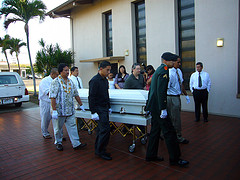 Our hearts go out to the bereaved family and friends of a young husband and father who recently died in a para sailing accident off Long Boat Key, Florida. We wish them every relief and comfort during this time of devastating loss.
Our hearts go out to the bereaved family and friends of a young husband and father who recently died in a para sailing accident off Long Boat Key, Florida. We wish them every relief and comfort during this time of devastating loss.
This unfortunate event brought to mind the fact that this family will now be faced with necessary decisions and expenses related to transporting the deceased back home to South Carolina. We decided to dig a little into what must be done when a tragedy like this happens.
Funeral Shipping by Air
It’s important to  understand that you cannot arrange for air transportation of human remains directly with the airline, whether the shipping will occur across international boundaries or not. This is due to the transportation requirements, which are determined by the Office of the Consulate General. Every country has specific rules and regulations that must be complied with in order for a body to be shipped inside of, into, or out of that country.
The U.S. Transportation Security Administration (TSA) has partnered with funeral homes to ensure that human remains can be safely transported by air. Funeral homes who are ‘known shippers’ are those recognized by the TSA as licensed and qualified to accomplish this delicate task.
Inter-city funeral shipping
Depending on the events surrounding the death, the deceased may be transferred to a local funeral home or held in the city or hospital morgue. To arrange for shipping, you’ll need two funeral homes – one locally and the second in the final destination. Those funeral homes will generally coordinate the transportation arrangements. Those costs will have to be paid.
International funeral shipping
An international shipping effort requires an immense amount of coordination. To ship the deceased to another country, you’ll need to contact an international funeral service provider who specializes in this type of shipping.
The steps that must be accomplished include:
- Care of the body and preparation for shipping.
- Gaining approval from state and federal offices, including those receiving the body.
- Delivery of the body onto the international flight.
What does it cost?
If the body will be flown to its final destination, the airline will impose their charges. Airfare is determined by the combined weight of the deceased, the casket and the approved shipping container. Once the deceased reaches the final airport, of course, additional transportation must be arranged to get the body to the local funeral home.
Costs vary depending on the funeral service provider, but according to recent research: door-to-door international funeral shipping will cost between $4,000 and $9,000.
How does travel insurance help?
Of course, your travel insurance assistance services will help you locate and coordinate with approved funeral services providers. Covered expenses typically include those related to embalming, cremation, and an approved container for transportation.
All travel insurance plans have a list of general exclusions and will not cover any loss resulting from those listed exclusions. It’s important to understand what those exclusions are and realize that coverage for repatriation of mortal remains may not be covered if the insured was participating in an activity that is listed as excluded from coverage. (Note: pre-existing conditions are not excluded from evacuation and repatriation expenses, but the insured must purchase the plan within a certain number of days after making the initial trip deposit.) Many travel plans require the insured to be traveling a certain number of miles from home for repatriation to be considered a covered expense.
In all cases, all arrangements must be approved in advance by the travel insurance company in order for those expenses to be covered.
